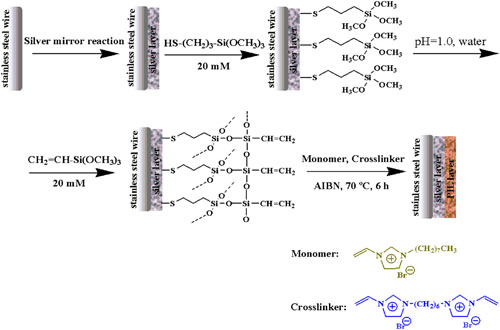Efficient extraction of hydrophilic and polar compounds from samples with a polar matrix is comparatively more difficult, owing to their high affinities with sample matrix. Coating materials for polar analytes should have appropriate polar functionally groups. But simply increasing the polarity of the sorbent to enhance its affinity for polar analytes is not efficacious because its affinity for the matrix is also enhanced, which may lead to competitive adsorption and finally to the elimination of the analytes.
Researchers at CAS Key Laboratory for Natural Medicine of Gansu Province, Lanzhou Institute of Chemical Physics (LICP), and University of Jinan have prepared a novel cross-linked polymeric ionic liquid (PIL) sorbent with satisfactory stability and durability in situ via crosslinking polymerization processes on micro-structured-silver coated stainless steel wire. 1,1'-(1,6- Hexanediyl)bis(1-vinylimidazolium) bibromide ionic liquid was synthesized and used as the crosslinking agent, with 1-vinyl-3-octylimidazolium bromide as monomer.
Coupled to gas chromatography (GC), the fiber was successfully used for detection of polar alcohols in aqueous matrix by headspace mode. Improved thermal stability and long life span were the main advantages of the proposed fiber compared with non-crosslinked PIL fibers. The as-established headspace (HS)- solid-phase microextraction (SPME)–GC method was applied successfully to determine aliphatic alcoholic components in liquor beverages. The new proposed fiber has been proved to be a suitable candidate for headspace extraction of polar analytes in polar matrix with sufficient sensitivity, repeatability and wide linear ranges.
The work has received support from National Natural Science Foundation of China and the findings have been published in Journal of Chromatography A(Journal of Chromatography A,1245 (2012) 32– 38).

Schematic representation of functionalization of stainless steel wire and preparation of copolymeric ionic liquid-coated fiber.
